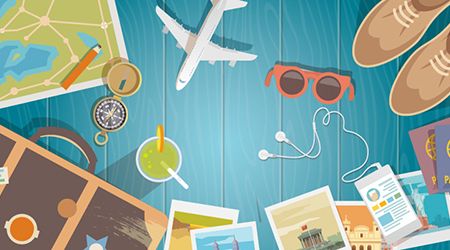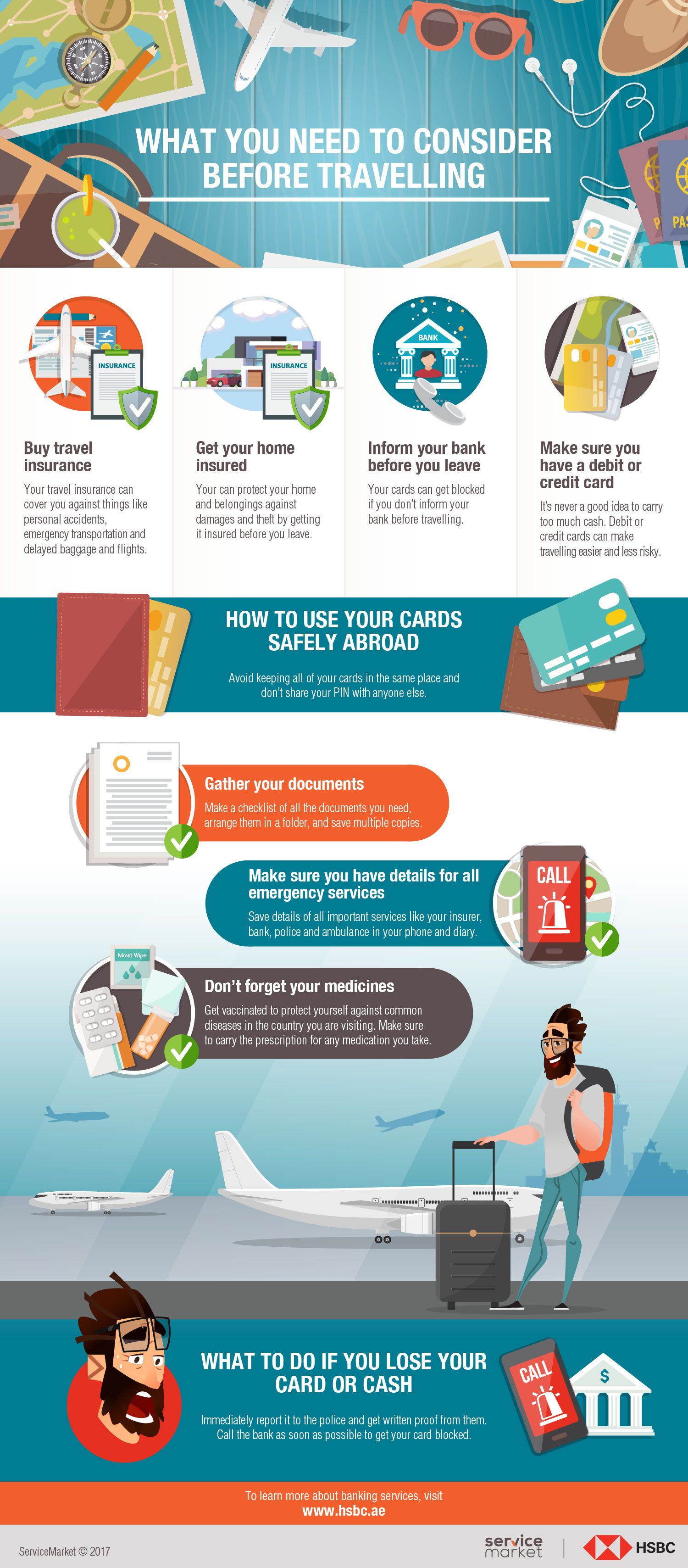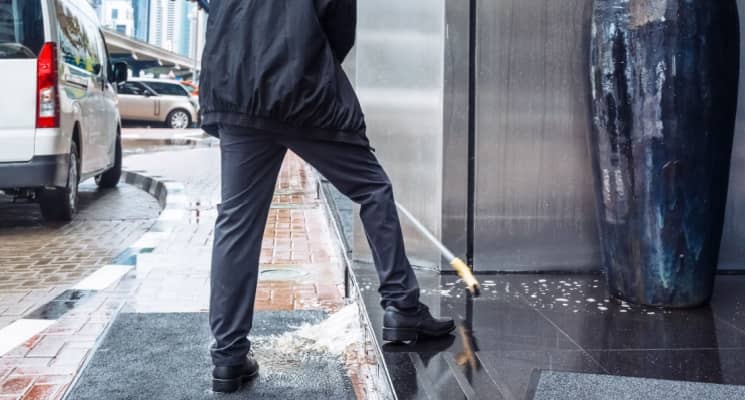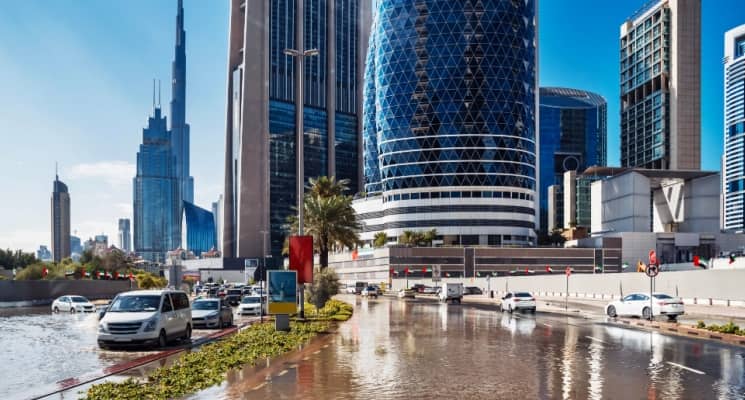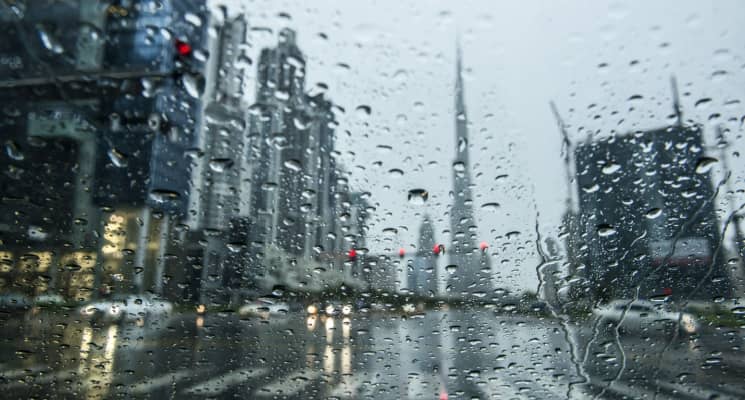As you will be far from the safety net of your friends and family back home while travelling, you should definitely take some precautionary steps to make your travels safer and hassle-free. Even simple measures like buying insurance and learning how to use your credit card properly can give you peace of mind. By following these tips, not only can you ensure that you and your loved ones are protected, but you can also secure your home and assets while you’re travelling.
Buy travel insurance: A lot can go wrong while you are travelling. Be it lost luggage or medical emergencies, travel insurance covers a variety of issues and mishaps. You can protect yourself with HSBC’s travel insurance provider for both holidays and business trips. HSBC’s travel insurance provider can also cover personal accidents, emergency transportation, repatriation of another insured person, and delayed baggage and flights. You can even claim an economy ticket in case you have to return early due to a family emergency.
Get your home insured: Many people feel apprehensive when travelling even after buying a travel insurance policy because their property and other assets back home remain unprotected. This worry is not unfounded since your home and belongings can get damaged or stolen in your absence and you could face huge losses when you come back. The easiest way to put this worry to rest is to get your home insured before you leave. Home insurance policies cover damage to the building as well as your home contents. It will even provide you protection against damage caused by burst water pipers, and your home insurance can cover your belongings such as your camera and phone in case you lose them while you are away. If you already have home insurance, ensure that it won’t expire while you are travelling.
Inform your bank before you leave: Not informing the bank that you’ll be travelling is a very common mistake. You might face serious financial hurdles if you don’t do so. The biggest reason is that your cards can get blocked. Banks keep track of card transactions and watch out for the ones that don’t fit the usual pattern. Transactions in a foreign country can raise a red flag if you didn’t inform them before leaving. Calling the bank from another country to verify your details and get your card unblocked can prove to be a big hassle.
Make sure you have a debit or credit card: It’s never a good idea to carry too much cash with you while traveling, especially if you like to wander. You could lose your wallet/purse or it could get stolen. Debit and credit cards can help you overcome those risks. It’s usually more affordable to withdraw money from ATMs with your debit card. On the other hand, credit cards are ideal for shopping, booking hotels and buying airline tickets. Some hotels will require a credit card to block a security deposit amount when you check-in. You even get discounts and free air miles with some types of credit cards, so if you’re a frequent traveler it pays off to explore your options to find the credit card that’s most suitable for you.
How to use your cards safely abroad: First of all, check the expiry dates of your cards to make sure that they won’t expire while you are traveling. Next, figure out how much you plan to spend on your holiday or business trip and consider your worst-case scenarios while budgeting to be on the safe side. Now see if your available bank balance and credit limit are enough to meet your expenses. Don’t keep your cards in the same place so that you don’t risk losing all of them at the same time. To avoid fraudulent activity, don’t share your PIN with anyone else, never leave your receipts at shops or ATMs, and beware of other people looking over your shoulder when you are entering your PIN. Be sure to cancel authorizations for advance reservations when you return a rented car or check out from a hotel.
Gather your documents: Many people face delays and hassles because they start gathering their documents at the last moment. To make the process easier and quicker, make a checklist of all the documents you need for travelling and then arrange them in a folder. Check the validity of your passport and visa before travelling to avoid any issues at the airport that might hamper your travel plans. Make multiple copies of your airline tickets, hotel reservations, and passport. Consider saving a digital copy of each document on your laptop or phone because it can be useful if you lose anything.
Make sure you have details for all emergency services: You need to be extra careful when you are in another country and are not familiar with their local services and procedures. Write down details of all the important services in a small diary or save them in your phone. Remember to include details of your insurance provider, bank, hotel, police and ambulance.
Don’t forget your medicines: Do some research before you travel to figure out what are some of the common diseases in that country. Get vaccinated to protect yourself against these diseases. In case malaria is prevalent in the area you’re visiting, take along some mosquito nets and repellents. If you have allergies or other medical conditions, make sure you have enough medicines to cover the entire duration of your trip. You might not be allowed to carry some medicines without a prescription, so do keep it in your folder.
What to do if you lose your card or cash: If your cash gets lost or stolen, immediately report it to the police and get written proof from them. Remember to send a copy of the police report along with the claim form to your insurance provider. People who have a debit or credit card can use it to meet their financial needs in case they lose their cash. However, if you lose one or more of your cards, be sure to call the bank as soon as possible to get them blocked. Doing so will prevent others from using them. Make sure you know how to get in touch with your bank when you are overseas. You should also inform the local authorities. In case you lose your money and cards at the same time, consider calling a family member or friend and ask them to transfer some funds to the account of one of your fellow travelers.

